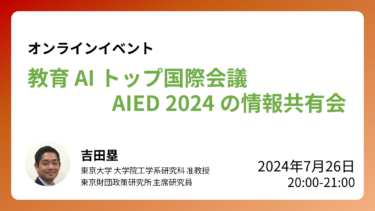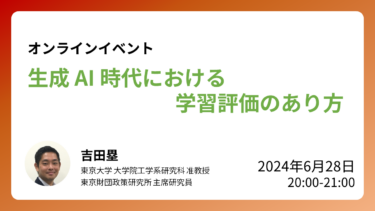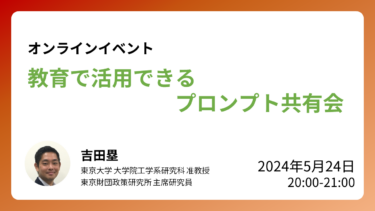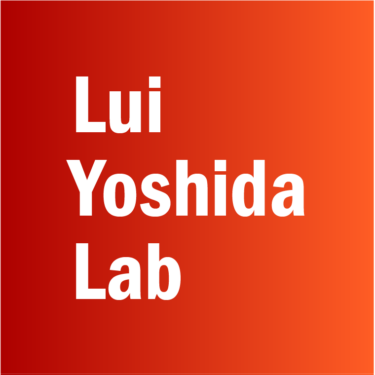4月2日と4月10日にワークショップ「より良い学振申請書(DC1/DC2)を作成しよう」を日本語で開催したのですが、英語版での実施要望もありまして、確かに英語での情報が足りないと感じたので、急遽ではありますが Webinar を実施いたします。英語での情報を求めている方にご共有いただければ幸いです!
参考: 4月2日の様子(https://edulab.t.u-tokyo.ac.jp/2022-04-02-report-jsps-researcher/ )、4月10日の様子(https://edulab.t.u-tokyo.ac.jp/2022-04-10-report-jsps-researcher/ )
On April 2 and April 10, we held the workshop “より良い学振申請書(DC1/DC2)を作成しよう” in Japanese, but there were requests for an English version, and we felt that there was certainly not enough information available in English, so we will hold a webinar. We would be happy to share this information with anyone who wants it in English!
Reference: April 2 (https://edulab.t.u-tokyo.ac.jp/2022-04-02-report-jsps-researcher/ ), April 10 (https://edulab.t.u-tokyo.ac.jp/2022-04-10-report-jsps-researcher/ )
[Title] How to write a better Gakushin(学振) proposal
[Overview]
This webinar will be held to share and discuss key points in preparing the JSPS application form (学振申請書) required when applying for a JSPS’s Research Fellowships for Young Scientists (DC). Although the benefits of being selected are great, I, Yoshida, feel that preparing the application itself will lead to refinement of your research content and plan. Therefore, I would very much like to have you prepare a good research proposal and conduct better research (I would like to conduct the kind of workshop that I wish I had when I was a student).
In the workshop, I will first share what you should keep in mind when preparing the Gakusho application form, as well as reference information. Then, I will give my example and share detalied tips for writing a proposal. Finally, I will answer questions.
[About JSPS’s Research Fellowships for Young Scientists (DC)]
JSPS’s Research Fellowships for Young Scientists (DC) provides an environment in which you can concentrate on your research. Specifically, as a Research Fellow, you will receive a monthly research grant of 200,000 yen (non-repayable) and research expenses of up to 1.5 million yen each year. In addition, 87.7% of those selected as a Researh Fellow (DC) have been appointed to a “full-time research position” within 10 years (Source: Results of the FY 2020 Survey on the Employment Status of Research Fellow-DC https://www.jsps.go.jp/j-pd/data/pd_syusyoku/r2_dcgaiyou.pdf accessed on 12 March 2022).
Furthermore, as described in the overview, I feel that through the process of preparing an application for a research fellowship, the research plan will be refined, and I encourage all students entering the doctoral program to prepare an application.
[Date] Sunday, April 17, 2022, 7:00 – 8:00 p.m. (We would like to answer any questions that come in after the webinar, so if you are interested, please join us there as well!)
[Venue] Zoom or YouTube Live (please access when the time comes)
Zoom: Details after registration
YouTube Live: https://youtu.be/NBAGimYJIzo
[Pariticipants] Those who plan to prepare or are involved in preparing an application for an JSPS’s Research Fellowships for Young Scientists (DC)
[Capacity] 300 people for Zoom participation, unlimited for YouTube Live viewing and participation
[Fee] No charge.
[Lecturer] Associate Professor Lui Yoshida, Graduate School of Engineering, The University of Tokyo
[Supporter] Rintaro Chujo, 4th-year student of psychology, Faculty of Letters, The University of Tokyo
[Registration form] https://forms.gle/uoCg5gEQaLPgXsuD6 (Deadline: 1 hour prior to the date and time of the event; no registration is required for YouTube viewing, but please apply if you wish to receive a reminder)
[Website] https://edulab.t.u-tokyo.ac.jp/2022-04-23-jsps-dc-webinar-english/
[Lecturer] Lui Yoshida
Associate Professor, Graduate School of Engineering, The University of Tokyo. He specializes in educational technology (faculty development, active learning, online learning). He is the translator or author of “Learning Assessment Techniques: A Handbook for College Faculty” and “How to Live after Becoming a Doctor?”. He has conducted several workshops on writing academic grant applications in the past, and has been involved in improving more than 100 applications. He has experience in being adopted as a JSPS’s Research Fellow (DC1) (interview waiver).
[Notes]
– The webinar will be broadcast on YouTube and a recording will be made available later.
– The recording may include the names of Zoom participants (please change the name to something you are comfortable with publicly displaying).
– The webinar, including screen shots and comments by participants, may be published as articles or educational materials on websites, etc.
– Participation in this workshop does not necessarily lead to adoption.
We hope that many of you will join us, so if you would like to spread this information to your friends and groups, we would greatly appreciate it. We look forward to seeing you there!






